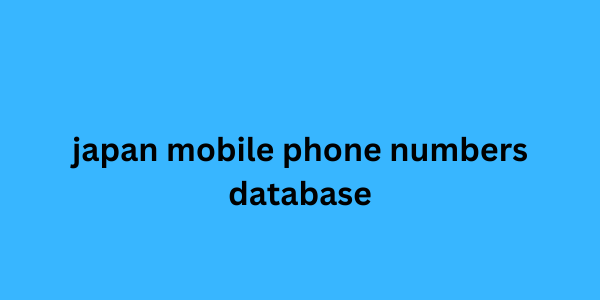People forgot to add that they were simply bursting with envy (I'm sure none of these moralists would refuse a new Mac) and that Alina's success simply got like a lump in their throat. One lady even put together a demotivator about this.
Offline it would look like this - a person decided to help another person and gave 100 rubles. The hater should have run up to him and started screaming - what are you doing, you're going to give her a whole Mac's worth of it now! And she's using it! Bitch!
Frankly, strangers shouldn't care what other strangers do with their japan mobile phone numbers database money. But on Facebook, everyone cares a lot. Because no one chipped in for Mac.
Alina is a seasoned veteran, she made a great post based on the story on the topic "write in the comments what you want and what you can give in return", which caused a lot of comments and raised the status of her page. Which is good for a blogger.
But let's get back to the haters. From my experience working with my numerous clients, I know that people are terribly sensitive to negativity online.
I recommend my clients do the following: divide the negative into two formats.
1. When a person expresses a point of view and you can debate with him. This is not a hater. You need to talk to him. Such people can be difficult conversationalists, but it will play to your advantage - the more comments, the better. In a discussion, you open up. You need to communicate with such people - activists are active in all directions. And if you become friends with them, then you will get a new Facebook friend and even an advocate for your personal brand.
2. Haters. Those who immediately start telling you how to live or write that you are a bad person.
You don't need to stand on ceremony with haters. The story about how you need to answer them, and deleting such assholes is nothing more than a manifestation of weakness - simple manipulation.
Our task is to preserve our psyche and not worry about every freak.
What should we do?
Present the story offline
To begin with, just imagine that this is happening offline. You are standing on the street, waiting for a friend or even talking to him. A drunk or aggressive or crazy person comes up to you and starts shouting “Russia has been destroyed, all because of people like you! Prostitute!” What are you going to do? Argue with him? Prove?
The most reasonable thing to do in this case is to just leave. Remove the hater from your territory.
And it’s good if the person has an avatar on Facebook. But what if he has a cat instead of a face? Then offline, on the street, a cloud should come up to you and start talking to you in the same way. You wouldn’t argue with a cloud, would you?
When you get another lousy comment, remember the story about the street and offline. Haters are just city lunatics. You don't need to communicate with them, engage in discussions, waste energy and nerves. You just need to block them.

Set your rules
What's also important is to write about it. Let people know the rules of your game. And do as you see fit on your Facebook.
Didn't you invite them? If they write all sorts of crap, then issue a warning and ban them. So that others can see.
Believe me, sometimes people get hooked on hatred (Ksenia Borodina is so hated that special hate groups are created, can you imagine?). The best way to punish them is to deprive them of the opportunity to hate you, that is, simply block them.
Ask questions that baffle
Well, I'll add something useful from myself. For inadequate people, the question "Who are you anyway?" is very helpful. It baffles them.
If they answer it, move on. Ask "What are you doing on my Facebook?" / "Why did you decide that someone asked you here?", "When I'm interested in your opinion, I'll definitely ask," etc.
And be polite. Try, at least:))
I wish everyone health, happiness, good and kind subscribers, and respect to Alina.
Your Facebook psychologist Eva Katz.
